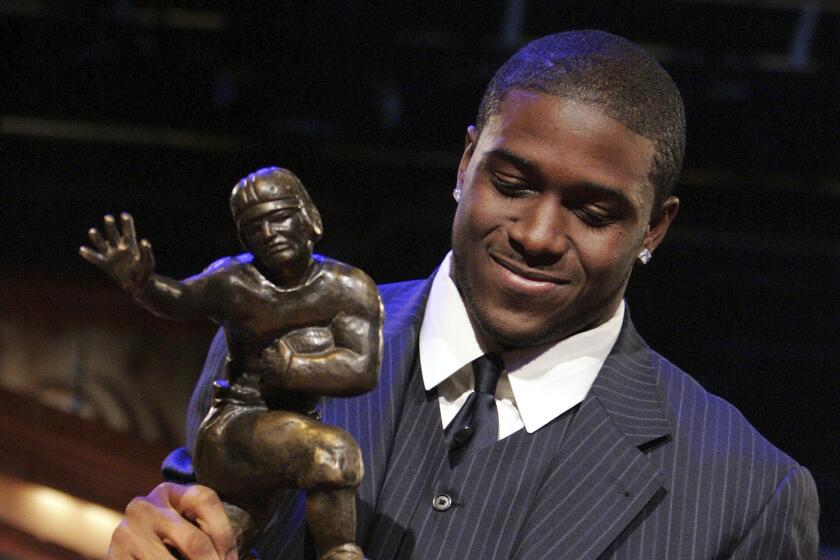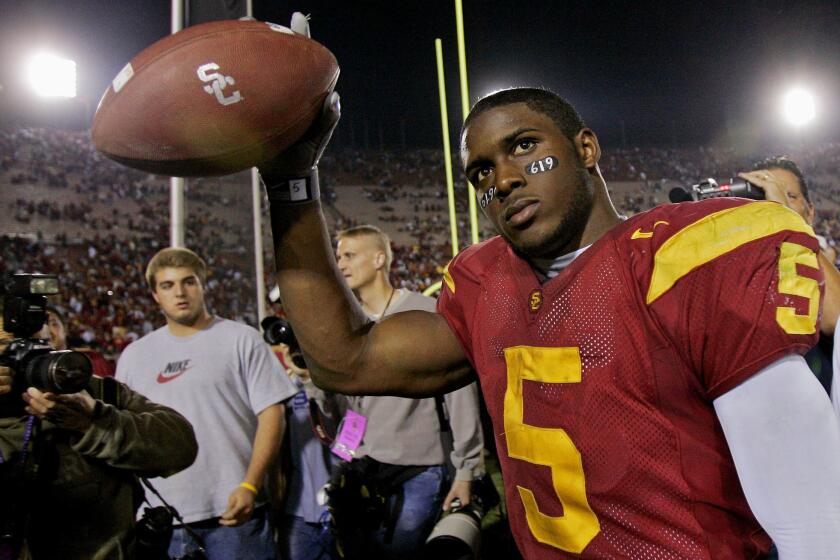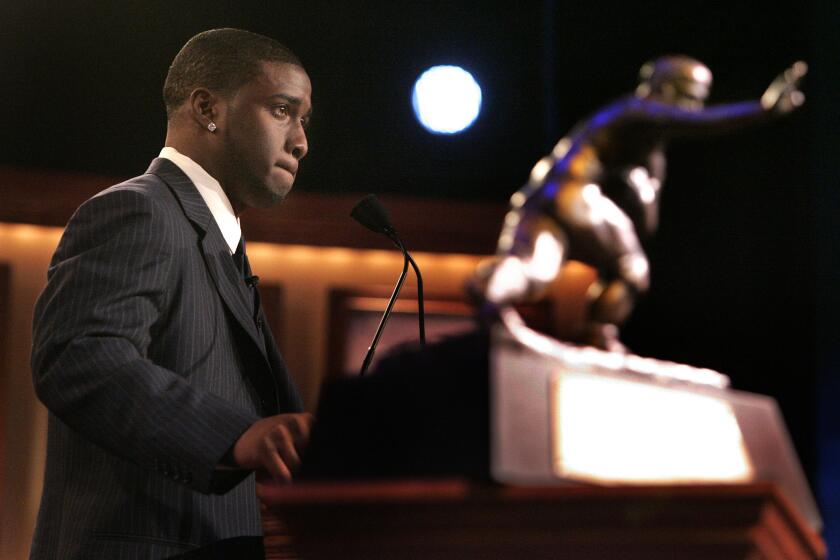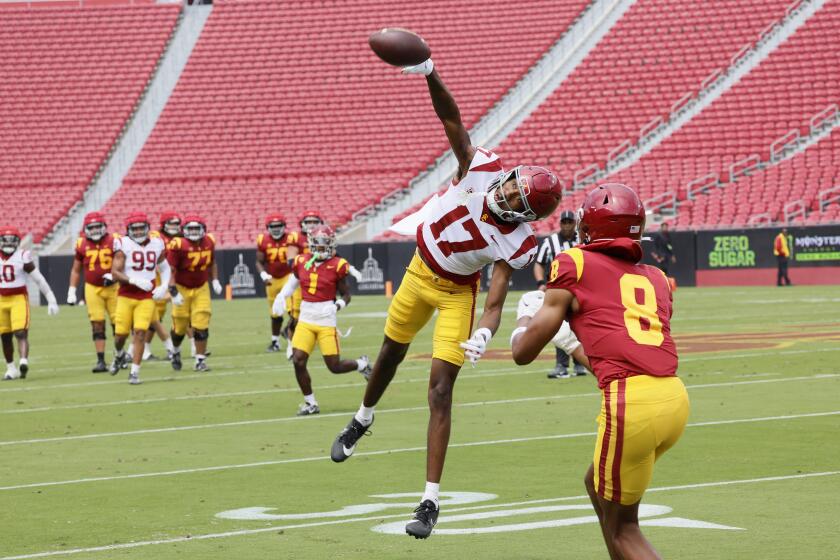At His Doorstep
Nick Holt wanted to be a head football coach in the worst way and got his wish this year when he took over at the University of Idaho.
Against the advice of some colleagues, Holt left his “loved-it” job as linebackers coach for the national champion USC Trojans to become his own boss at a one-pump pigskin gas station.
Holt described it as going “from the top of the food chain to kind of the bottom of the food chain in, really, one stroke of the pen.”
Holt had prepared himself for the long hours, dealing with the media, the cocktail mixers with boosters and, at least in the short term, the prospect of losing more games than winning.
There was one thing the 42-year-old coach had not prepared for:
Murder.
Nowhere in the head-coaching handbook did it explain dealing with a 0-3 start and the cold-blooded slaying of your starting cornerback.
So, Nick Holt, you wanted to be a head coach?
Holt got the jolt in his office, on the evening of Sept. 19, as he was reviewing the wreckage of his team’s 49-8 thumping by Washington State the previous day.
Eric McMillan, a redshirt freshman for the Vandals, had been shot in the chest at his off-campus apartment at 5:30 p.m.
He stumbled down the stairs, dripping blood and pleading for help. A neighbor drove McMillan to the hospital, where he died 12 hours later.
He was 19.
The Idaho coaching staff was not allowed into McMillan’s room in intensive care, so he died alone, his life ending in front of no one he knew, far from his Alabama roots.
The irony was, McMillan had been steered to Idaho because relatives thought it would be safe.
It said so right there in the football media guide -- “Moscow’s violent crime rate is 85% below the national average ... “
Three weeks into his first season, Nick Holt and his staff had kin to notify, relatives to console, a team to hold together and a game plan to devise for Oregon.
Instead of ducking for cover, Holt took responsibility for McMillan’s death.
“This happened on my watch,” Holt said as he sat bleary-eyed in his office on a Halloween Sunday morning. “This is happening and I’m the head coach and I am the guy who is ultimately responsible for all that happens within our football program.”
He couldn’t be serious, but he was.
“He was recruited by the previous staff but, by the same token, you go in these homes and you tell the moms and dads, ‘Hey, they’re going to be safe in my program. They’re going to go to class. They’re going to be disciplined kids, they’re going to play hard.... You’re going to give me your son and in four or five years, you’re going to get back a really first-class person.’
“And now, this happens. He’s in our program, but he’s not going back to see his folks ... mean, someday in heaven. But I take that as a personal responsibility.”
So maybe there’s more to being a head coach than what you see on television.
To think Holt has been asked what he does with all his free time, since he works only 11 games a year.
It’s not just about Xs and O’s anymore. College coaches become ministers, investigators, grief counselors, strategists, politicians and surrogate parents.
By last count, Holt says, he has a wife, his own two boys and 110 stepchildren.
Football gives him his extended family, and he says a coach has to be front and center when life happens.
Most coaches take their jobs seriously and personally.
Dirk Koetter, when he was coaching at Boise State, lost a player when Paul Reyna struck his head on ground at practice, developed a blood clot and died.
Koetter, now the coach at Arizona State, keeps a picture of Reyna on his desk. He has called the player’s death the toughest thing he has ever had to deal with.
Last summer, two days before he was to report to fall camp at Oregon, prized recruit Terrance Kelly was shot and killed in Richmond, Calif. Coach Mike Bellotti still has a tough time talking about Kelly’s death.
When tragedy strikes a football team, the coach becomes point man.
Two years ago, USC recruit Drean Rucker drowned at Huntington Beach, only a few weeks before he was to start a promising career on a title-contending team.
Suddenly, Pete Carroll’s shoulders became shoulders to cry on.
“There’s just nothing you can do but show them all the love you can,” Carroll said of dealing with Rucker’s family. “There’s nothing that’s enough. That’s the hard part of that. There’s nothing you can do that’s enough. You wish you could.”
When USC offensive line coach Tim Davis learned that an Idaho player had been killed, he wanted to jump on a plane and be with his friend, Holt.
Davis and Holt had recruited Rucker to USC.
One death was tough enough, and now two?
“No one should have to go through that,” Davis said of Holt. “I mean, there have been head coaches who have been head coaches for 20 years that have never gone through something like that. Then, right out of the gate, that happens to him?”
Davis said he was struck by Holt’s resolve and figured there would be no bigger test than this in his friend’s young coaching career.
Davis said adversity “doesn’t give you character, it just reveals who you are.”
It revealed itself to Holt when he learned of McMillan’s death at 5 a.m. on Sept. 20.
“I’ve got to take charge,” Holt told himself.
He and his staff took turns notifying and consoling McMillan’s relatives. The player was raised in Alabama by his grandmother, who later sent Eric and his sister to live with their uncle in Murrieta, Calif.
“I knew what I was getting into,” Holt said, “but you never envision something like this happening. I’m sure Coach Koetter and Coach Bellotti never envisioned it either.”
Holt called his team together and broke the news, then canceled Monday’s practice. Holt told his staff that the next few days were going to be crucial.
“Leadership is really easy when things are going good,” he said. “We’re 0-3 and this happens. They want to see how we react, and what kind of people we are.”
McMillan’s relatives were flown to Moscow to spend time around the football program. Eric was buried in Tuskegee, Ala.
Authorities still don’t have a motive for McMillan’s death.
Last week, brothers Matthew and James Wells of Seattle were indicted on first-degree murder charges. Also charged was their nephew, Thomas Riggins.
The Wells brothers were arrested after a high-speed car chase that crossed into Washington. They are being held in Colfax, Wash., awaiting extradition to Idaho.
Details are sketchy, but authorities know that, after the team’s loss to Washington State on Sept. 18, some Idaho players were involved in a confrontation at a Moscow bar called “The Beach.”
It is not believed McMillan was directly involved in the fight but, the next afternoon, the killers arrived at his apartment door.
“We’re not sure why it happened,” Latah County prosecutor Bill Thompson said. “Was it mistaken identity or was it random? We know what happened, but why it happened is still perplexing. I don’t think we’ll ever know for sure why it happened, but we don’t have to prove why.”
Idaho’s season has gone on as scheduled. The Saturday after McMillan’s death, Idaho lost at Oregon, 48-10. The Vandals have won three games and lost seven.
No one pretended the transition was going to be easy for Holt, from the 90,000-seat Coliseum to the 16,000-seat Kibbie Dome, from Pacific 10 Conference to Sun Belt, from “Fight On” to a fight for survival.
The football squad he inherited had gone 11-35 in four previous seasons.
Complying with NCAA Division I-A minimum attendance standards this year would require Idaho to play two home games at the Kibbie Dome and two in another state.
Idaho even got to count its game against Washington State in Pullman -- only an eight-mile drive across the border -- as a home game.
And how about the trips -- at Middle Tennessee State and at Troy, Ala., -- on consecutive October weekends?
Holt was ready, though. He took copious notes while working for Carroll at USC and was set to meet the challenges.
“Some guys don’t want to be a head coach,” Holt said. “Some guys want to be lifelong assistants. They don’t want the responsibilities. Some guys don’t want to get in the arena. They want to basically be good soldiers all their life, but that’s never been my style. That’s never been me. I’ve always been a leader.”
Holt has kept one eye on his program and one eye on the murder investigation. He says he plans to attend the trial.
“Oh yeah,” Holt said. “Eric was a good kid. He went to class. He would have graduated and been very successful in whatever he was going to do. Now, it’s just a waste.”
Despite a first season no one would wish upon anyone, Holt remains upbeat.
“Every time you talk to him, it’s 100 mph,” Davis said. “It’s, ‘We’re building Rome and we’re going to conquer the world.’ ”
Davis says he doesn’t doubt that Holt will make it as a head coach. Davis knows he will.
“Everyone was scratching their heads at first,” Davis said of Holt’s decision to leave USC. “But he’s like Lou Holtz when he was at William and Mary -- he thought he should have won the national title there. Nick won’t hit the wall and say, ‘That’s it.’ He won’t take no for an answer.”
Holt says the thought of turning back “never crosses my mind.”
Murder was not supposed to be on the prospectus, but he says dealing with it is all part of his job.
“It is,” Holt said. “It really is.... The sun rises the next day and we move forward. Hopefully, we’re all better people for what we’ve all learned back in September.”
Holt could have stayed at USC and been a part, perhaps, of another national championship run.
Instead, in going his own way, he has been tested in ways he could not have imagined.
“That’s what makes life,” Holt said. “You don’t ever stay the same, man. You can sit there and be comfortable and happy. That’s not me. I’ve got things to do. I’m going to make a difference. I’m not kidding.”
And he wasn’t.
*
Times staff writer Gary Klein contributed to this report.
Go beyond the scoreboard
Get the latest on L.A.'s teams in the daily Sports Report newsletter.
You may occasionally receive promotional content from the Los Angeles Times.




